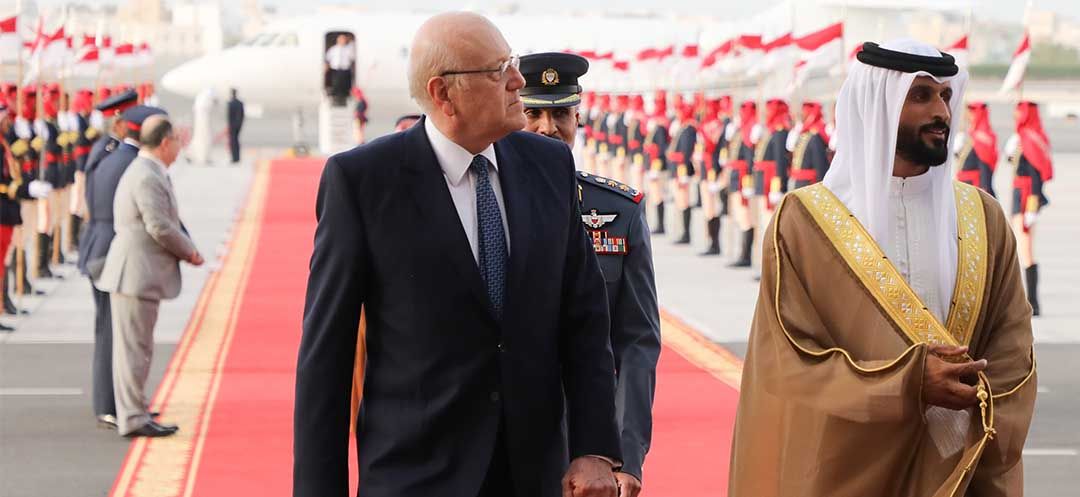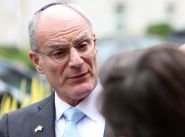
Caretaker Prime Minister Najib Mikati underlined, in his address at the Arab League summit in Bahrain on Thursday, Lebanon’s strong “attachment to its Arab identity,” which he said offers it protection and support.
“We need to follow up on three main issues of concern in Lebanon today, notably the escalation of violence on the southern border, the growing number of Syrian refugees and the vacancy in the presidential post, which is the main crisis,” Mikati told leaders of the 22-member Arab bloc.
For Mikati, the war that has been going on for more than seven months in south Lebanon is “the result of Israel's continuing attacks and persisting violations of Lebanon’s national sovereignty and UN Security Council Resolution 1701,” which he said amount to 35,000 violations since 2006.
He reaffirmed Lebanon's “commitment to legitimate international resolutions” and called for pressuring Israel "to withdraw from occupied Lebanese lands and end its violations and aggression by land, sea and air.” He also stressed “the need for a comprehensive and effective implementation of resolution 1701, coupled with a full set of clear international guarantees.”
Mikati then sounded the alarm about the increasing number of Syrian migrants and “the heavy economic, social and security repercussions” posed by their massive presence “on Lebanon's limited resources.”
He called for “the reactivation of the League of Arab States' Contact Group on Syria, which will help achieve a unified Arab vision, and for the development of a funding mechanism to ensure the necessary resources to facilitate and accelerate the return of Syrian migrants to their homeland”.
“We emphasize Lebanon's readiness to cooperate fully, in particular with neighboring Arab and European countries, to resolve this crisis (...) by ensuring the return of Syrians to safe towns and villages and offering them the necessary aid in their own countries," Mikati insisted.
The caretaker premier expressed particular concern about the protracted presidential vacancy, stressing that the Lebanese were placing high hopes on the efforts of the five-nation group – the United States, France, Saudi Arabia, Egypt and Qatar – to help political forces in Lebanon overcome this impasse.
He also called for dialogue “as an indispensable prerequisite for restoring stability and starting the process of recovery and revival” in the country.
Mikati closed his speech with a wish for “active support from the Arab brethren to help Lebanon overcome its crisis and put it on the road to prosperity and economic progress.”
“We need to follow up on three main issues of concern in Lebanon today, notably the escalation of violence on the southern border, the growing number of Syrian refugees and the vacancy in the presidential post, which is the main crisis,” Mikati told leaders of the 22-member Arab bloc.
For Mikati, the war that has been going on for more than seven months in south Lebanon is “the result of Israel's continuing attacks and persisting violations of Lebanon’s national sovereignty and UN Security Council Resolution 1701,” which he said amount to 35,000 violations since 2006.
He reaffirmed Lebanon's “commitment to legitimate international resolutions” and called for pressuring Israel "to withdraw from occupied Lebanese lands and end its violations and aggression by land, sea and air.” He also stressed “the need for a comprehensive and effective implementation of resolution 1701, coupled with a full set of clear international guarantees.”
Mikati then sounded the alarm about the increasing number of Syrian migrants and “the heavy economic, social and security repercussions” posed by their massive presence “on Lebanon's limited resources.”
He called for “the reactivation of the League of Arab States' Contact Group on Syria, which will help achieve a unified Arab vision, and for the development of a funding mechanism to ensure the necessary resources to facilitate and accelerate the return of Syrian migrants to their homeland”.
“We emphasize Lebanon's readiness to cooperate fully, in particular with neighboring Arab and European countries, to resolve this crisis (...) by ensuring the return of Syrians to safe towns and villages and offering them the necessary aid in their own countries," Mikati insisted.
The caretaker premier expressed particular concern about the protracted presidential vacancy, stressing that the Lebanese were placing high hopes on the efforts of the five-nation group – the United States, France, Saudi Arabia, Egypt and Qatar – to help political forces in Lebanon overcome this impasse.
He also called for dialogue “as an indispensable prerequisite for restoring stability and starting the process of recovery and revival” in the country.
Mikati closed his speech with a wish for “active support from the Arab brethren to help Lebanon overcome its crisis and put it on the road to prosperity and economic progress.”
Read more



Comments